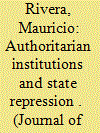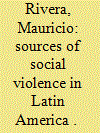| Srl | Item |
| 1 |
ID:
156539


|
|
|
|
|
| Summary/Abstract |
Existing research has paid increasing attention to the role of political institutions such as legislatures and opposition parties in autocracies. So far, however, the relationship between nondemocratic institutions and state repression has remained largely unclear. This article argues that authoritarian institutions are related to divergent conflicting dynamics between incumbent regimes and opposition actors, which provide leaders with opposite incentives to repress. While authoritarian legislatures enhance leaders’ capacity to prevent conflict and reduce their need for repression, the presence of opposition parties helps opposition actors to overcome collective action barriers and mobilize against the incumbent regime, increasing the states’ need for repression. A panel data analysis of nondemocracies from 1976 to 2007 shows that authoritarian-elected legislatures reduce repression and the presence of opposition parties increases it. Moreover, the results indicate that autocracies with opposition parties and an elected legislature experience lower repression than autocracies with opposition parties but no elected legislature.
|
|
|
|
|
|
|
|
|
|
|
|
|
|
|
|
| 2 |
ID:
143325


|
|
|
|
|
| Summary/Abstract |
The study of social violence in Latin America has stood at the periphery of cross-national research despite the region being one of the most violent in the contemporary world. This article provides a comprehensive review of theories of crime and presents an empirical analysis of social violence in Latin America from 1980 to 2010. The literature often emphasizes one theoretical approach over others and existing explanations are seen as competitive rather than complementary. Yet, the empirical findings of this study support different explanations and illustrate how considering different theoretical approaches helps improve our knowledge on social violence phenomena. The results from different estimation methods reveal that youth bulges, female workforce, and post-conflict states are positively associated with social violence, as measured by homicide rates. The results also show that states’ efforts to strengthen judicial system capacity and increase school attendance can promote peace. Moreover, while drug producers and/or transit countries are not systematically related to social violence, money-laundering countries experience higher homicide rates, suggesting that not all dimensions of drug-markets increase violence. Whereas Latin America as a whole has experienced few episodes of civil wars in the past decades, the findings suggest that several factors affecting the onset of civil wars also influence other forms of non-political violence such as social violence. This echoes earlier calls in the literature on the necessity of bridging conflict and criminology research.
|
|
|
|
|
|
|
|
|
|
|
|
|
|
|
|